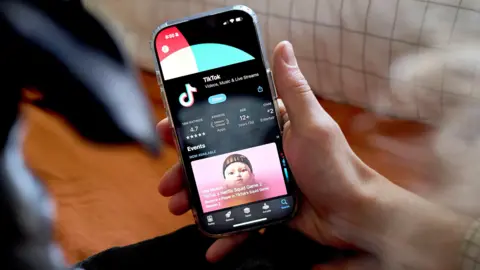Unofficial TikTok downloads surge in the US
 Getty Images
Getty ImagesTikTok's uncertain future in the US has caused a surge in people putting the app on their phones through unofficial means, the BBC has been told.
An executive order from President Donald Trump means the social media platform can be used in the US despite the Supreme Court upholding a law which will see it sold or banned.
Even so, Apple and Google are preventing new downloads of the app meaning people are increasingly turning to a technique called "sideloading" if they want to get it for the first time or reload it to a new device.
It involves users turning to third-party sites, which are sometimes referred to as black markets, rather than official retailers to get hold of software.
One such company, Signulous, says 120,000 people have used its services to get TikTok onto iPhones.
Neil Pomperleau, from the firm, shared screenshots from his dashboard that showed more than 2,000 downloads per hour at times.
"One of the most popular apps in the world can only be sideloaded in the US so it's been a good thing for us with record traffic to our site and a spike in customers", he told the BBC.
People in the US are also turning to virtual private networks (VPNs), which allow users to pretend they are in a different country - so TikTok fans can make it appear they are in Canada, for example, where the ban does not apply.
Search engine queries for "VPN" hit an all-time high last month, according to Google data.
- When could TikTok be banned and will Trump save it?
- Apple 'like The Godfather' with new App Store rules
Dozens of YouTube guides about the method have been viewed hundreds of thousands of times in the last three weeks.
Experts say the trends show how difficult a ban would be to enforce, if one is introduced when a final decision on TikTok - due by April - is made.
Is it legal?
Currently it is not illegal to download TikTok and although US lawmakers ruled that distributing it is against the law, both President Trump and his predecessor, Joe Biden, indicated they would not enforce it.
Unofficial app shops like Mr Pomperleau's operate in a legal grey area by signing up customers to software developer accounts.
The firms often charge a fee to take customers through the technical process of sideloading - something which comes with an increased risk of downloading faulty or malicious software due to the stores being less well-resourced than official app stores.
Mr Pomerleau - whose firm charges people a $20 annual fee - admits he is operating in risky territory.
"The law on the books is that TikTok is not allowed to be distributed in the US but we're sort of operating on this pinky swear from two different US presidents that they won't enforce this law."
"I imagine Google and Apple are a little too risk-averse for their size and the whole situation's really unpredictable," he says.
TikTok itself appears to trust the President's promise too.
On Monday it released a download kit to make it easier for Android users to sideload the app onto devices. Sideloading on Android phones is more common than on iPhones.
Another iPhone sideloading company called AppDB has had nearly 95,000 TikTok downloads and seen its membership double since the ban according to screen shots shared with the BBC.
"People will always find a way to get what they want," says Aleksei Borodin from AppDB.
One US user who downloaded TikTok through the sideloading process, Dewayne Puckett, said it was "an experience, but the app works like normal".
Apple argues that sideloading apps is a security risk and has long insisted apps need to be vetted and verified through the official App Store.
The company charges an average 30% commission to apps using its store, which it says is for the protection of consumers.
Although the fee is controversial, it is true that generally Apple is more successful at keeping malicious apps out than other marketplaces like Google's Play Store.
Since March last year Apple has been forced to allow competition app shops onto the iPhone in the EU after new laws were passed to encourage more choice.
